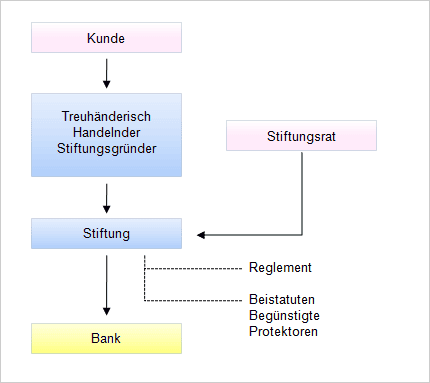Preserving the past, shaping the present, securing the future – our partners establish and manage family foundations as well as foundations with a social and cultural purpose in the Principality of Liechtenstein.
Foundations
In many countries, the state pay-as-you-go pension system is the only way to provide for retirement. Over time, however, this system is proving less and less able to provide a comfortable retirement. Most people today are still reluctant to think about what will happen to their assets after death (or in the event of any other critical situation), and so they do not make any attempt to put their own financial circumstances in order, with the aim of making this task easier for descendants or loved ones. In many cases, the establishment of a foundation is a reliable means of solving the above-mentioned problems of providing for one’s old age.
The establishment of a foundation requires that property (the assets of a foundation) be dedicated to a specific purpose. The founder is free to determine the purpose of the foundation. It must be specific, possible, reasonable, and not illegal or immoral.
Examples of purposes are:
- Payment of individual amounts to family members for support, education, training, and maintenance
- Making periodic payments to individual, specifically named beneficiaries and distributing the assets of the foundation to these beneficiaries upon dissolution of the foundation.
In addition to the property of the foundation, the establishment of a foundation requires the foundation deed, in which the founder sets forth essential information and regulations, such as the name, the purpose and duration of the foundation, the appointment of the board of trustees, the circle of beneficiaries, and provisions for the use of the property of the foundation in case of dissolution. The foundation deed usually contains provisions of principle, while the nature and scope of the designation of beneficiaries and the class of beneficiaries are specified in the by-laws or rules. In addition, the foundation is often established by a trustee, so that the name of the founder does not appear in the foundation instrument. The foundation instrument or bylaws, if any, must also provide information on how to amend the foundation instrument and bylaws.
Our partners establish and administer family foundations and foundations with social and cultural purposes in the Principality of Liechtenstein. If desired, they will also set up the necessary statutory organs of a foundation.
The following diagram shows the most important concepts of a foundation:

A major difference between Liechtenstein foundations and other foundations lies in the fact that the founder can reserve for himself the right to amend the foundation’s statutes and by-laws. The founder may also always reserve the power of revocation for himself. In this case, the foundation may be revoked at any time at the discretion of the founder. The property of the foundation then reverts to the founder.
An overview of our services:
- Advice on the appropriate jurisdiction and legal form for the protection of your assets and succession planning
- Elaboration of possible variants of the foundation structure
- Establishment of a foundation and assumption of the mandate as trustee
- Preparation of all necessary documents and their delivery to authorized representatives

